The Boxer Rebellion (1900-1901)
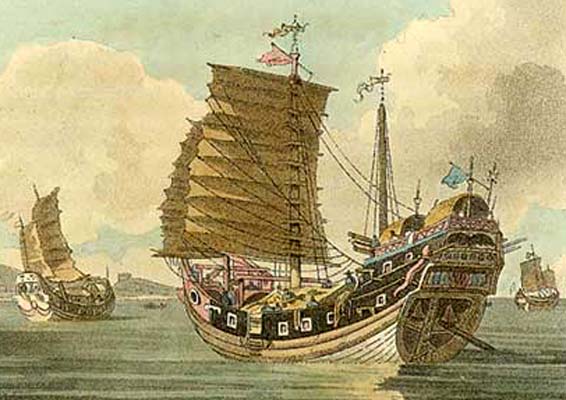
I. Background
The Boxers, or Yihequan - "The Righteous and Harmonious Fists," were a religious society that originally rebelled in 1898 against the imperial government of Guangaxu, the 11th Qing Emperor of China, who ruled under the influence of the Dowager Empress Cixi, in Shantung. Foreigners called members of this society "Boxers" because they practiced martial arts.
The Boxers practiced an animistic magic of rituals and spells which they believed made them impervious to bullets and pain. The Boxers also believed that the expulsion of foreign devils would magically renew Chinese society and usher in a new golden age. Much of their discontent, however, was focused on the economic scarcity of the 1890's.They were a passionate and confident group, full of contempt for authority and violent emotions.
In reality, the Boxer rebellion could hardly be classified as either a rebellion or a war against the Europeans. China was largely under the control of regional Governors General. These regional officials ignored the Empress Dowager's instructions and put forth every effort to prevent disorder or any harm coming to foreigners.
The Boxer Rebellion, then, was only limited to a few locations, but concentrated itself in Beijing (known as Pekin or Peking at the time). The Western response was swift and severe. Within a couple months, an international force, which included Austria, France, Germany, Italy, Japan, Russia, the United Kingdom and the U.S., captured and occupied Beijing and forced the imperial government to agree to the most humiliating terms, known as the Boxer Protocol of 1901.
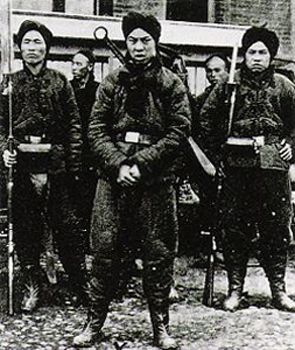
The Boxers
Under the Boxer Protocol, European powers maintained the right to garrison military forces in the capital, thus placing the imperial government more or less under arrest. The Protocols suspended the civil service examination, demanded a huge indemnity to be paid to European powers for the losses they had suffered, and required government officials to be prosecuted for their role in the rebellion. In addition, the Protocols suspended all arms imports into the country.
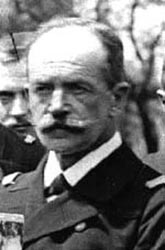
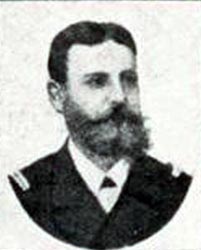
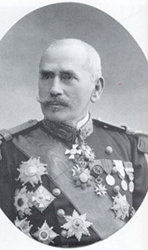
RADM Count Rudolf Montecuccoli, Corvette-Captain Eduard Thomann von Montalmar and General Henri Nicolas Frey
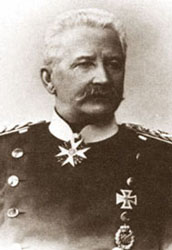
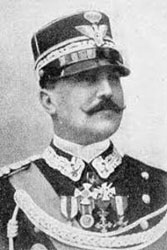
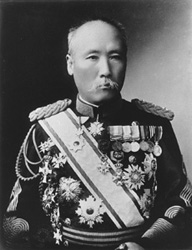
Gen Alfred Graf von Waldersee, Colonel Vincenzo Garioni and Viscount Fukishima Yasumasa
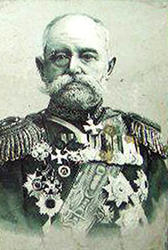
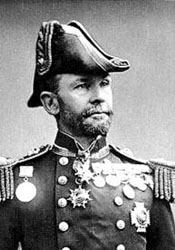
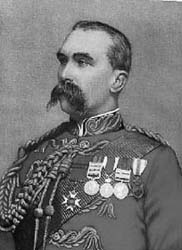
General Nickolai Linevich, Sir Edward Seymour and MGEN Alfred Gaselee
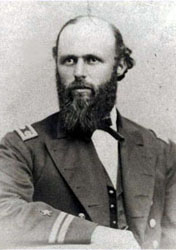
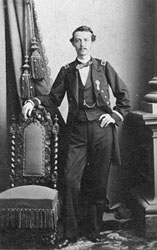
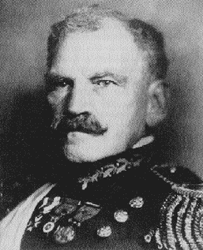
RADM Louis Kempff, USN, Col. Robert Meade, USMC and MGEN Adna Chafee, USA

I. Background
The Boxers, or Yihequan - "The Righteous and Harmonious Fists," were a religious society that originally rebelled in 1898 against the imperial government of Guangaxu, the 11th Qing Emperor of China, who ruled under the influence of the Dowager Empress Cixi, in Shantung. Foreigners called members of this society "Boxers" because they practiced martial arts.
The Boxers practiced an animistic magic of rituals and spells which they believed made them impervious to bullets and pain. The Boxers also believed that the expulsion of foreign devils would magically renew Chinese society and usher in a new golden age. Much of their discontent, however, was focused on the economic scarcity of the 1890's.They were a passionate and confident group, full of contempt for authority and violent emotions.
In reality, the Boxer rebellion could hardly be classified as either a rebellion or a war against the Europeans. China was largely under the control of regional Governors General. These regional officials ignored the Empress Dowager's instructions and put forth every effort to prevent disorder or any harm coming to foreigners.
The Boxer Rebellion, then, was only limited to a few locations, but concentrated itself in Beijing (known as Pekin or Peking at the time). The Western response was swift and severe. Within a couple months, an international force, which included Austria, France, Germany, Italy, Japan, Russia, the United Kingdom and the U.S., captured and occupied Beijing and forced the imperial government to agree to the most humiliating terms, known as the Boxer Protocol of 1901.

The Boxers
Under the Boxer Protocol, European powers maintained the right to garrison military forces in the capital, thus placing the imperial government more or less under arrest. The Protocols suspended the civil service examination, demanded a huge indemnity to be paid to European powers for the losses they had suffered, and required government officials to be prosecuted for their role in the rebellion. In addition, the Protocols suspended all arms imports into the country.
| Eight Nation Alliance | ||||
| Nation | Commander | Warships | Marines | Soldiers |
| Austria-Hungary | RADM Count Rudolf Montecuccoli Corv,-Captain Eduard Thomann von Montalmar |
4 | 296 | 0 |
| France | General Henri Nicolas Frey | 5 | 390 | 3,130 |
| Germany | Gen Alfred Graf von Walfersee | 5 | 600 | 300 |
| Italy | Colonel Vincenzo Garioni | 2 | 80 | 0 |
| Japan | Viscount FukiShima Yasumasa | 18 | 540 | 20,300 |
| Russia | General Nikolai Linevich | 10 | 750 | 12,400 |
| United Kingdom | Sir Edward Seymour MGEN Alfred Gaslee |
8 | 2,020 | 10,000 |
| United States | RADM Louis Kempff, USN Col. Robert Meade, USMC MGEN Adna Chafee, USA |
2 | 295 | 3,125 |



RADM Count Rudolf Montecuccoli, Corvette-Captain Eduard Thomann von Montalmar and General Henri Nicolas Frey



Gen Alfred Graf von Waldersee, Colonel Vincenzo Garioni and Viscount Fukishima Yasumasa



General Nickolai Linevich, Sir Edward Seymour and MGEN Alfred Gaselee



RADM Louis Kempff, USN, Col. Robert Meade, USMC and MGEN Adna Chafee, USA
Website Maintained by Vaudezilla